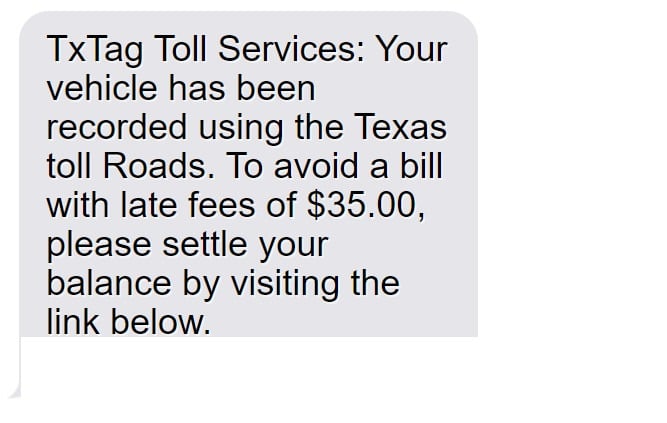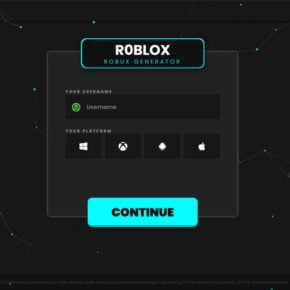A new text message scam has emerged involving fake notifications about unpaid Texas toll road fees. This scam uses the name “TxTag” and threats of penalties to trick people into visiting malicious sites. Don’t let them fool you – read this comprehensive guide to learn how this TxTag scam works and how to avoid toll road text scams.

Overview of the TxTag Texas Toll Roads Text Scam
A new and alarming text message scam has emerged that is deceiving drivers throughout Texas. This scam involves receiving a text claiming your vehicle used toll roads and immediate payment is required. While it may seem legitimate on the surface, this is an intricate con impersonating TxTag and other toll agencies to steal personal information and money from victims.
This scam often begins when a random text pops up on your phone stating: “TxTag Toll Services: Your vehicle has been recorded using the Texas toll Roads. To avoid a bill with late fees of $35.00, please settle your balance by visiting the link below. https://tagtx.net” Of course, your first reaction may be surprise or panic, worrying you racked up toll charges unknowingly. However, take a breath and realize this is most likely a complete scam designed to mislead you.
These messages are being blasted out en masse to phones across Texas hoping to snare a few victims. The scammers are preying on the fact that millions of Texas drivers use toll roads and have TxTag accounts. By posing as TxTag and claiming your car used toll roads, many people let their guard down initially thinking it’s a real notification. But legitimate toll agencies do not contact drivers randomly via text message regarding account balances.
The texts are made to seem urgent, warning fees will be added if you don’t pay quickly. This is a trick to panic you into immediate action before thoroughly verifying the situation. When worried about owing money, it’s human nature to want to settle things ASAP. But that is exactly the reaction scammers want in order to steal your information.
If recipients click the link in the message, it leads to elaborate fake websites designed to mimic official TxTag portals. The sites even use the TxTag logo and navigation links to seem authentic. When victims arrive at the sites, they are prompted to enter personal and payment information to settle the “unpaid toll balance.” But in reality, any data entered will go straight to scammers who plan to misuse it for financial theft or identity theft crimes.
These virtual toll road bandits have a sophisticated operation that so far has duped numerous honest citizens. They are able to blast out huge volumes of texts using autodialers and advanced communication technology. The fake websites they create are very convincing, playing on victims’ worries over owing fees. Many people have provided their private data or even paid the scammers. The crooks then use the stolen info to drain bank accounts, make unauthorized credit charges, steal identities, and more.
Some victims have reported receiving harassing follow up calls demanding more money after making an initial “toll payment” to the scammers. The crooks will claim there were errors processing the payment, or additional toll fees are still owed. Then they direct victims to even more fake websites to steal additional financial information. Their goal is to take as much money from victims as possible.
Unfortunately, once your personal information ends up in the hands of these scammers, it can be sold on the dark web and used to destroy your finances and credit. That’s why it’s critical to identify warning signs of this scam before ever clicking on links or providing data. You also need to know how to minimize damages if you did fall victim and give up info.
How the TxTag Texas Toll Roads Text Scam Works
These virtual toll road bandits have a clever system for ripping people off. Here’s an in-depth look at the anatomy of this scam:
Step 1: Blast Texts En Masse
The scammers use autodialing technology to send texts en masse to random phone numbers. This allows them to spam as many unsuspecting people as possible with the fraudulent toll road fee messages.
The texts use the name “TxTag” to seem legit. But TxTag is the real electronic toll program in Texas – they don’t contact drivers by text over unpaid balances.
Here is how the text message looks:
TxTag Toll Services: Your vehicle has been recorded using the Texas toll Roads. To avoid a bill with late fees of $35.00, please settle your balance by visiting the link below. https://tagtx.net
Step 2: Direct Victims to Fake Websites
If recipients click the link in the message, it takes them to elaborate fake websites made to look like official TxTag portals. They use TxTag logos and claim you can pay the outstanding toll fees there.
But in reality, it’s all a ruse to steal personal and financial information. The official TxTag.org site will never lead to forms asking for sensitive data to pay fees.
Step 3: Harvesting Victims’ Information
If people enter any personal or payment information into the scam sites, the crooks can gain access to:
- Bank account funds if routing/account numbers provided
- Credit cards if card data is given
- Car registration/insurance data from uploaded docs
- Private identity info like SSNs and DOBs
With this data, scammers can drain bank accounts, make unauthorized charges, steal identities, and more.
Step 4: Harassing Victims for More Money
Scammers will often follow up with more texts or calls demanding additional payments. They may say:
- Your payment failed, more tolls are due
- Extra fees have been added
- Provide new fake sites to enter payment info
This is done to scam even more money from victims. Ignore any further contact – they will keep trying to take more.
Watch for These Red Flags of the TxTag Scam
While the texts look convincing, some key signs can help expose the scam:
- Threats of urgent late fees or penalties – Legit toll programs don’t demand instant payments with threats.
- Links to sketchy third-party websites – Official agencies won’t link to unfamiliar payment portals.
- Pressuring immediate action – Scammers want you to act before thinking. Real Toll agencies won’t force panic payments.
- Grammatical/spelling errors – Real agencies are meticulous. Scammy texts often have mistakes.
- Requests for detailed personal/financial info – Legit toll payments won’t require documents with SSNs and more.
If you see these red flags, avoid interacting or sharing data. Contact official TxTag support online or by phone with any payment concerns.
What to Do if You Got Scammed by Fake TxTag Texts
If you already interacted and shared any sensitive info, take these steps ASAP to limit damages:
- Contact your bank/credit card providers – Have them lock or close compromised accounts. Watch for any suspicious charges.
- Place fraud alert and credit freeze – This locks your credit reports. Stops the thieves opening new accounts in your name.
- Change login details on all accounts – Update passwords, security questions, and enable two-factor authentication where possible.
- File police reports – Report the scam to local law enforcement and FBI Internet Crime Complaint Center.
- Notify contacts – Warn loved ones about the scam so they don’t fall victim too.
- Report scam texts – Forward the scam messages to 7726 (SPAM) and the FCC to aid investigation efforts.
- Monitor accounts and credit reports – Watch for any signs of misuse of your information and report unauthorized activity ASAP.
Frequently Asked Questions About the TxTag Toll Roads Text Scam
1. What is the TxTag Texas toll roads text scam?
The TxTag scam involves receiving a text message claiming your vehicle was recorded using Texas toll roads and that you owe unpaid toll fees. It will direct you to a website link to avoid $35 late fees. However, it is a fraudulent attempt to steal your personal and financial information. The texts are not really from TxTag or any toll agencies.
2. How do I recognize the TxTag toll road scam texts?
Watch for texts out of the blue stating you used toll roads in Texas and owe money. It will threaten you with $35 fees if you don’t pay immediately at their provided link. Legitimate toll agencies won’t contact you randomly via text about account balances.
3. What is the goal of the TxTag scam text messages?
The texts aim to trick you into visiting fake websites controlled by scammers. If you enter your information, they can steal your personal and financial data to drain accounts, make unauthorized charges, steal identities, and more criminal activities.
4. What type of information do the scammers ask for?
The fake websites set up by the scammers will ask for sensitive information like:
- Full name
- Home address
- Phone number
- Email address
- Bank account and routing number
- Credit/debit card numbers
- Social Security Number
- Driver’s license details
5. What do the scammers do with my information if I enter it?
The scammers can use your details in many illegal ways, such as:
- Drain your bank accounts and make unauthorized charges on credit/debit cards
- Steal your identity and open fraudulent accounts or take out loans in your name
- Sell your information on the dark web to other criminals
- Keep targeting you for more money via additional scam texts or calls
6. What are some warning signs of the Texas toll road scam texts?
Watch for:
- Threats of urgent late fees if you don’t pay immediately
- Suspicious links to sketchy third-party websites
- Requests for personal/financial data like SSNs and bank info
- Poor grammar/spelling errors
- High-pressure demands for fast payment
7. What should I do if I receive one of these scam texts?
- Do NOT click any links, call numbers, or provide any personal or financial information.
- Forward the scam text to 7726 (SPAM) to report to carriers.
- Contact official TxTag support to verify any supposed unpaid tolls.
- Delete the text immediately and block the sender.
8. What steps should I take if I already fell victim to the scam?
- Contact your bank/credit card company to halt any suspicious charges or transactions
- Place fraud alerts and credit freezes to lock down your credit reports
- Report the scam to local law enforcement and the FBI Internet Crime Complaint Center
- Monitor all accounts closely for signs of fraudulent activity
- Change passwords on all accounts and enable two-factor authentication when possible
9. How can I protect myself from the TxTag toll road scam going forward?
- Be wary of any texts claiming you owe government fees or taxes
- Avoid clicking links in unsolicited messages
- Contact official agencies directly with any payment concerns
- Never provide sensitive data to unverified sources
- Use strong passwords and enable two-factor authentication when possible
10. Who can I contact for more help with the TxTag Texas toll road text scam?
- Official TxTag customer service: 1-888-468-9824
- Texas Department of Transportation: 1-800-558-9368
- Your cell phone carrier to block scam numbers
- Local law enforcement agency
- FBI Internet Crime Complaint Center to report scams at ic3.gov
The Bottom Line
This TxTag scam is a dangerous ruse trying to capitalize on a real Texas toll service to steal money and identities. But following security best practices, watching for red flags, and acting swiftly if targeted can help you steer clear of their tricks.
Guard your info carefully and avoid acting rashly if surprised by texts claiming urgent toll fees. Contact official toll agencies directly with any payment concerns. Don’t let virtual highway bandits fool you and detour you onto the wrong road!



